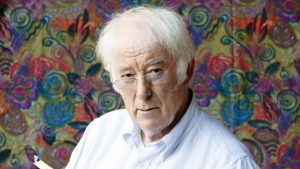We begin the week with a look at the profitability of the Seamus Heaney Estate. We also have a short article about a poetry book written by a former nun from Peru.
Record Profit Recorded By Poet’s Estate
 The estate of the late poet Seamus Heaney set up a company to handle the money earned from sales of his books, exhibitions and royalties. They have announced that last year the estate registered a profit of €151,000.
The estate of the late poet Seamus Heaney set up a company to handle the money earned from sales of his books, exhibitions and royalties. They have announced that last year the estate registered a profit of €151,000.
Popularity for the work of the Nobel laureate has not decreased since he died in 2013. The Bank of Ireland cultural centre in Dublin has put on an exhibition of his life work, the Heaney family farm in Co Derry has become an arts centre and in November “Seamus Heaney and the Music of What Happens”, a documentary about his life was broadcast on BBC2.
Two-thirds of the sales of works by living poets were made up by books by Heaney in the mid-Noughties and they still remain at the top of the list of the most popular selling poetry collections in both Ireland and the UK. In 2015 “Where all the Others Were Away at Mass” was voted the most popular poem from the last 100 years in Ireland.
The company, which was set up to “Preserve, promote and protect” the works of the poet, had €446,552 in intangible assets on their books at the end of 2019. Over the course of the last two years, the company has registered profits of €313,383. Directors of the company include the poet’s Widow and his three children.
In 2012, part of the literary archive that belonged to Heaney was donated to the National Library in a tax relief deal worth €1.4m, and in 2003 a collection of his correspondence was sold at a University in Georgia.
The Taoiseach, Leo Varadkar is very fond of quoting the poet during his speeches and Heaney’s work features heavily on exam papers.
Monica’s Overcoat of Flesh – Poetry Book of the Month
 Geraldine Clarkson’s first poetry collection Monica’s Overcoat of Flesh has been hailed as the poetry book of the month by the Telegraph newspaper.
Geraldine Clarkson’s first poetry collection Monica’s Overcoat of Flesh has been hailed as the poetry book of the month by the Telegraph newspaper.
The poet, who once lived in a silent religious order when the act of creative writing was not allowed, has put together a collection of poems that it declared are thoroughly entertaining. The book is inspired by the poet’s time spent as a nun in Peru. The poet lived in the silent order for a number of years and daily life was filled with preoccupations about the basic necessities such as food and water, and thoughts about scorpions and snakes.
Whilst anyone reading about the poets past might expect the book to be full of rather sombre poems they would be wrong. They are joyful, fun and full of alliteration. It isn’t a rebellion again the religious traditions that the poet lived with, but rather a new and interesting way of looking at it.
The newspaper recommends the book but also confirms that it may not be to everyone’s taste. The humour and wording make easy reading but the eclectic nature of the poems may not work for everyone.


You must register to comment. Log in or Register.